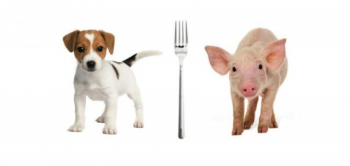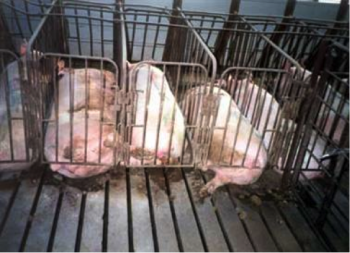Why are people appalled at abusing a dog but not when it happens to a pig, cow, chicken etc.? Where is the mental disconnect?

Social psychologist Melanie Joy explores the ways we numb ourselves and push down our natural empathy for animals. In Why We Love Dogs, Eat Pigs, and Wear Cows, Joy examines factory farming, exposing how inhumanely the animals are treated. It analyzes many other aspects of animals used for food and experimentation. The book offers a look at why and how humans can so fully devote themselves to certain animals and then allow others to suffer. I was inspired by her work and wanted to shed light on this.
Most people know it’s wrong to abuse their pets, so where is the difference in doing it to other animals? I know if someone put a dog or cat in the same conditions as factory farmed animals, they would be deemed psycho. The vast majority of farmed animals never see daylight and never get to act out their natural instincts. Mother pigs are chained to enclosures for the entire lives. Egg-laying chickens are crammed into tiny cages after their beaks are seared off. If you believe dogs and cats have interests, then logic says other animals do also.
These “farm” situations are not some isolated incident. Everyone is speaking out about it. Here is a link that exposed pig abuse documented and reported by Mark Bittman, an American food journalist, author, and columnist for The New York Times.
It’s not necessary – not the torture certainly, but not even the killing
Science now clearly shows that animal products are not needed in the human diet and, in most cases, actually cause harm. And from an ethical point of view, whether animals should be killed at all is another story. Check out the this great piece from the BBC if you’re interested.
So, maybe some people really don’t know this stuff is happening. This is sort of believable. It is all done in a factory farm, a building with no windows in the middle of nowhere. Can you imagine the effects on the people that work here? I try to believe people just don’t know, but every time the subject comes up or real evidence is presented to them I too often hear, “That is gross. I can’t watch that,” or “Don’t show me that: I want to enjoy my food.“
Why don’t people want to know? It’s 2014. We have access to the information about what really goes on. Most people must be creating walls in their minds. The human mind is fascinating. It has the capability to do all sorts of things in order for us to survive. For example, we tend to mentally separate things until we can make sense of them and restore continuity and reality. But who wants to constantly live in survival mode? Making this connection between the food we think is “normal” and the tremendous suffering involved in getting it onto our plates would give people a greater sense of well-being and peace.
To have complete health, you can’t have a disconnect in your mind. This creates strife and stress and anxiety. Often times people don’t even know where their internal unrest is coming from. I think mental health is the first step in healing our society from a disconnected one to a connected one. People are told not to feel and they even treat each other with this disconnected sense of compassion — compassion for some but not all.
It is quite startling that we are wiling to eat tortured, diseased animals every day. There is obviously something we shut off when the knowledge of what it really took to get this food to our plate comes up. It appears we don’t care where our food comes from or what it is. I believe people do care and are just taught differently. And in a fast-paced world with so many demand, most of us are just trying to keep up.
On March 14, 2014, South Dakota became the final state to enact a felony provision for animal cruelty. Now there are laws in every state against animal cruelty, but farm animals are exempt in most. It is not sustainable or feasible at this time to feed everyone animal products at every meal. That’s why it has turned into a factory operating model of torture and abuse to meet the demand and so-called need for animal products.
Surely animals don’t exist to be tortured all their lives and killed just because we think they tastes good or because we want to test beauty products on them. Disconnect creates anxiety and fear which alone could create mental strife and disease. We act this out on each other. It actually can cause a block in spirituality and mental health — not to mention the obvious physical health effects of too many animal products.
There is good news. Speak up if you believe animals need sunlight and natural habitats. Why would you want to eat someone who has been abused and sick? Attorney Mariann Sullivan and animal rights activist, Jasmin Singer, both on the faculty at Main Street Vegan Academy, have teamed up to write some terrific articles. This one, in particular, shows there is a great deal of hope: Why animal agriculture is so scared.
The disconnect is deeply ingrained. It’s cultural and historical. But so is the power of compassion and love. It’s won out before, and it can do it again.
Tiffany Ann Hahner, RN, VLCE, Vegan Health and Wellness Coach, Registered Nurse.



This is such an insightful post, Tiffany! My favorite line is “To have complete health, you can’t have a disconnect in your mind.” People often ignore this important component to overall wellness. I love what Melanie Joy’s book does for unraveling common notions about what we eat and don’t eat, and why we should question our habitual patterns.